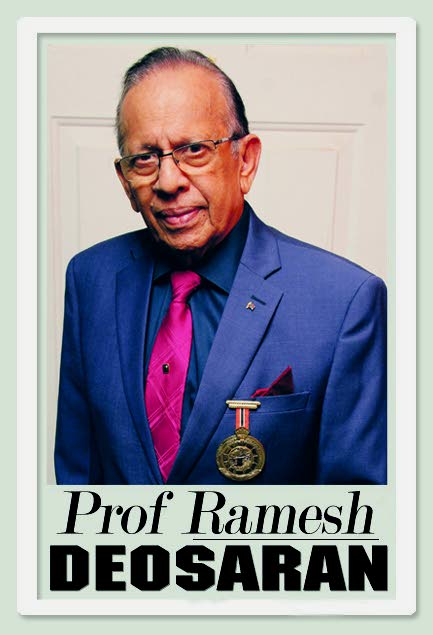Young rises, Kamla fights on

Now that the election campaign is in full noisy gear, voters, troubled by crime, the economy, broken infrastructure and food prices, will have to decide whom or what they believe in and which party they will vote for, or not vote at all.
Quickly following the UNC’s Sangre Grande jam-packed semi-launch two weeks ago, the PNM displayed a striking fight-back to a large crowd down San Fernando on April 2. The UNC's surprising platform stars were former senior superintendent Roger Alexander who promised to “bring Tunapuna home” and the feisty Public Services Association (PSA) president Felisha Thomas, who pledged to remove the PNM with the “yellow code.” (loud applause.)
Looking high-spirited and determined, Opposition Leader Kamla Persad-Bissessar, 72, strongly attacked the PNM government on crime, closing Petrotrin and financial waste.
“We will reopen Petrotrin,” she declared to loud applause. She further accused PM Stuart Young of leading a party with a ten-year history of “5,000 murders” and a failed “six billion dollars” expenditure on national security.
The UNC Sangre Grande audience looked large enough to give candidate Wayne Sturge hope. Not forgetting to salute Ms Persad-Bissessar as “the next prime minister,” he shared in the attack against the PNM on crime and “bad governance.” Nothing said about the salary increases for PM and parliamentarians.
Down San Fernando, the PNM, as they did in 2015 and 2020, loudly attacked the UNC with allegations of corruption. Faris Al-Rawi, whose San Fernando West seat is threatened by UNC's Dr Michael Dowlath, revived the “Piarco airport corruption case” and the infamous “section 34” to show “UNC corruption” even when Persad-Bissessar acted as attorney general or PM.
This time, PM Young added the accusation that the UNC’s promised expenditures will far outstrip the country’s revenue, especially with Persad-Bissessar and Dr Roodal Moonilal’s public commitment of “10 per cent at least” salary increase and accompanying back pay for public servants. Again, nothing said about the salary increases for PM and parliamentarians.
This summary is to help voters recognise what some of the major issues are and, as the election campaign continues, what the policy solutions are from all sides.
Further down the political landscape, we have ground-level politics. It was a pivotal strategy to have former prime minister Dr Rowley removed from the firing line – so far. However, 50-year-old PM Young now carries the heavy burden of explaining the PNM’s ten-year lapse with crime.
Would the unease following smiling Colm Imbert’s non-appointment as acting PM and then his removal as nine-year finance minister trouble PM Young after the election? Would the party’s 11-9 vote and unease over sidelining the mild-mannered Pennelope Beckles-Robinson manifest themselves sooner or later after the election? Or would PNM’s party discipline maintain order and stability?
Now Mr Young appears to recognise all this and as a relatively “newcomer,” working hard to deepen his in-party credentials as well as to capture the public imagination of him as PM. He seems prepared to achieve this by energetic street-walking along marginal seats and assertive, vote-catching platform speeches like with his new oil and gas deals.
“I will work for you,” he assured the receptive but rain-drenched San Fernando crowd. His “no-taxes” for public servants’ pensions and the “$1 million compensation” to each drowned divers’ family do bring a touch of compassion to his PM’s stature.
Ms Persad-Bissessar faces challenges of a different kind. Her party attracts large crowds, some reputable candidates and utilises widespread anti-PNM feelings from the Rowley era. However, she and her party again face lingering accusations of corruption. Such accusations contributed to the PNM vote in both 2015 and 2020. The revenue vs expenditure criticisms by the PNM and a few economists also require a UNC response from Dave Tancoo and her.
A UNC response to the PNM platform's “fears of a UNC devaluation” (TT$15 to US$1) may also help voters decide one way or another.
To what extent would Ms Persad-Bissessar’s shake-up of candidates adversely affect the UNC in constituencies such as Mayaro, Chaguanas West or Couva South? Is her electoral confidence strong enough to withstand internal political pressure before or after the April 28 election?
Will Tobago again play a critical role in the election results?
On the wider front, voters have already heard some plans from the PNM and UNC. Ms Persad-Bissessar announced a list of policies and projects, backed up by a series of “minifestos.” Voters now need to hear further from both leaders some actionable plans for police service reform, citizens’ payment for electricity and water, and constitution reform to include service commissions and parliament.
A fair and free election requires voters to read, listen and think.
(Prof emeritus Ramesh Deosaran was an Independent Senator, author of numerous books and journal articles on crime, policing, criminal justice, politics and education).

Comments
"Young rises, Kamla fights on"